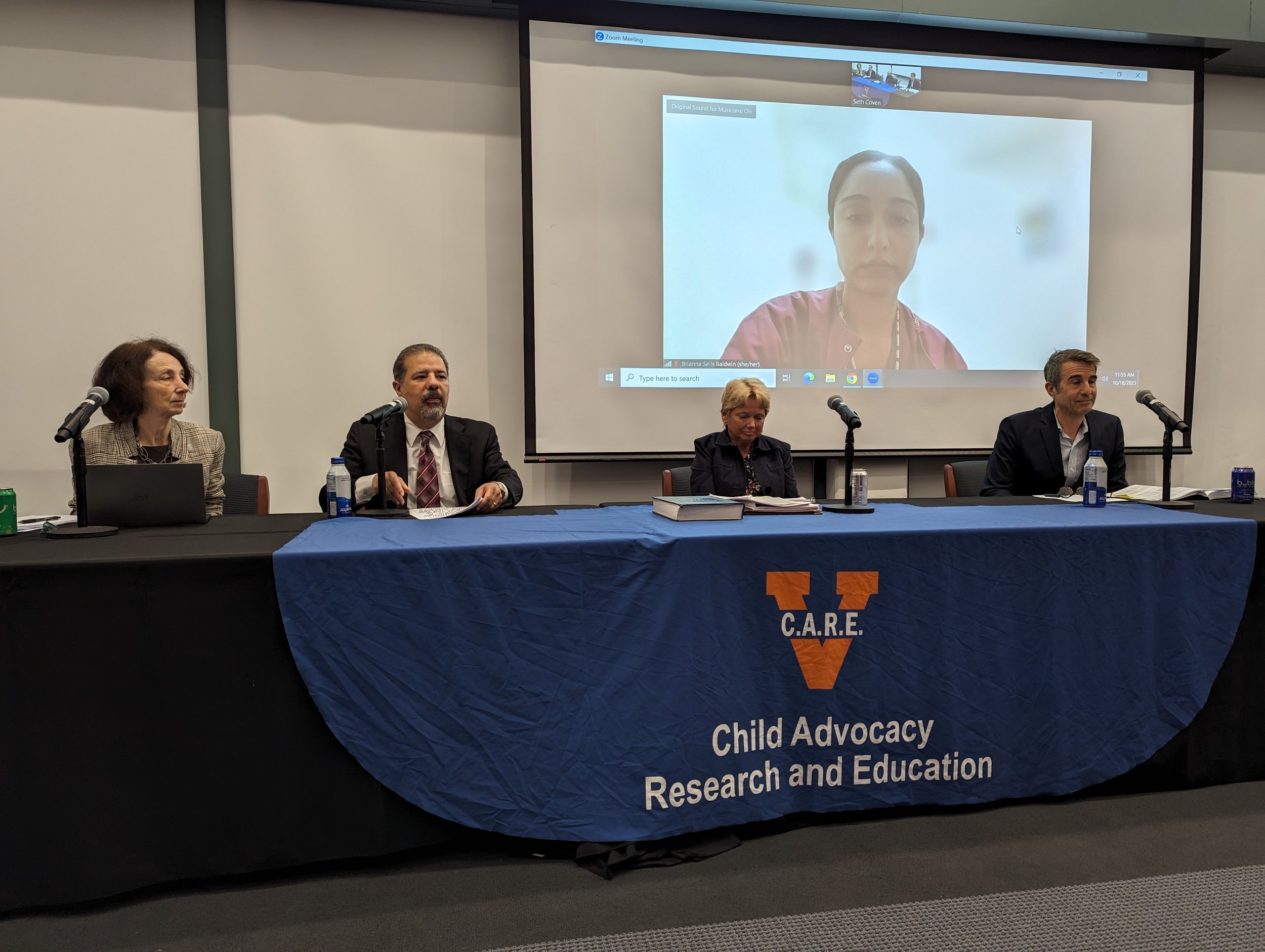Law School Panel Says Future Challenges to ICWA Likely
Andrew Allard '25
Executive Editor
Last Wednesday, October 18, Child Advocacy Research and Education (CARE), in cooperation with the American Constitution Society at UVA and UVA’s Native American Student Union, hosted a panel discussion of the recently decided Supreme Court case Haaland v. Brackeen,[1] in which the Court upheld the Indian Child Welfare Act (ICWA).
Photo Credit: Andrew Allard '25
Some 486 tribal nations voiced their support for ICWA, and the decision was welcomed by Native organizations.[2] Said Seth Coven ’25, President of CARE and organizer of the panel, “This is a really important topic that doesn’t get the same coverage as some of the other cases that came out this past summer. . . . The decision was a surprise to some, but in the eyes of CARE and a lot of advocacy organizations, it was a win.”
As the panelists explained, the Brackeen majority determined that ICWA was consistent with Congress’s plenary power to regulate affairs with Indian tribes. The Court also rejected petitioners’ argument that ICWA violates anti-commandeering principles, reasoning that Congress can dictate Indian adoption standards to the states under the Supremacy Clause.
But panelists expressed concern that ICWA may continue to be the target of legal challenges. “It’s only the beginning,” said Professor Andrew Block, who specializes in youth law. “Justice Kavanaugh, in a concurrence, leaves open the door to equal protection challenges, especially after the affirmative action decision.”
To be sure, future challenges to ICWA may ultimately fail. Professor Holly Clement, a former attorney from the Department of the Interior’s Indian Trust Litigation Office who recently joined the Law School as an adjunct professor, suggested that a 1974 case, Morton v. Mancari,[3] clearly weighs against finding that ICWA is racially discriminatory. “I do think you’ll see an equal protection challenge, but I don’t think it will be successful.”
Brianna Baldwin, a medical student at UVA and the president of the Association of Native American Medical Students, likewise explained that, under current law, members of Indian tribes are not a racial or ethnic group, but citizens of sovereign nations. Baldwin noted that in the wake of Students for Fair Admissions,[4] the American Association of Medical Colleges opined that the decision would not impact consideration of an applicants’ tribal membership because it is a political status, not a racial status.
Still, whether Mancari and other precedent can hinder future challenges to ICWA is unclear. Some justices have been willing to depart from the Court’s precedent, as in Students for Fair Admissions itself. Indeed, Justice Kagan even acknowledged in a recent interview at Notre Dame Law School that “there have been ideological divides with one side overturning precedent” in recent cases.[5]
For Native tribes, the stakes of legal challenges to ICWA are high. “Native communities experience higher rates of suicide compared to all other racial and ethnic groups in the U.S.,” Baldwin explained. “Connecting to community, to one’s own language, to one’s culture, to one’s background, can be a predictive health factor for Native youth.” Baldwin noted that the American Academy of Pediatrics and the American Medical Association filed an amicus brief in Brackeen emphasizing the importance of ICWA for the welfare of Native children.
Professor Naomi Cahn, an expert in family law, suggested that while ICWA is not perfect, it has had a positive impact on Native youth. “In Utah in 1976, an Indian child was 1,500 times more likely to be in foster care than a white child. Today—not great, but four times more likely.”
Indeed, such disparities are precisely what motivated ICWA’s enactment in the first place. As Professor Clement explained, ICWA grew out of the relationship between federal, tribal, and state governments. Under the Constitution, federally recognized Indian tribes are independent, sovereign nations, with exclusive power to manage their internal affairs. “The policy of keeping Indians free of state interference is deeply rooted in our history.” Despite that clear separation, Clement explained, “there’s always been a huge conflict with the states wanting to take on jurisdiction and trying to interfere.”
In writing the statute, Congress noted that “there is no resource that is more vital to the continued existence and integrity of Indian tribes than their children,” and that “an alarmingly high percentage of Indian families are broken up by the removal, often unwarranted, of their children.”
---
tya2us@virginia.edu
[1] 599 U.S. ___ (2023).
[2] Indian Child Welfare Act (ICWA) (Haaland v. Brackeen), Native American Rights Fund, https://narf.org/cases/brackeen-v-bernhardt (last visited Oct. 21, 2023).
[3] 417 U.S. 535 (1974).
[4] Students for Fair Admissions, Inc. v. President & Fellows of Harvard Coll., 600 U.S. 181, 143 S. Ct. 2141, 216 L. Ed. 2d 857 (2023).
[5] Josh Gerstein, Kagan Hopes Supreme Court’s Ideological Divide on Precedent Isn’t Permanent, Politico (Sep. 22, 2023 6:02 PM), https://www.politico.com/news/2023/09/22/elena-kagan-supreme-court-precedent-speech-00117760.

